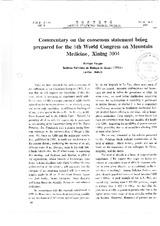Mostrar el registro sencillo del ítem
Commentary on the consensus statement being prepared for the 6th World Congress on Mountain Medicine, Xining 2004
| dc.contributor.author | Vargas, Enrique | |
| dc.date.accessioned | 2016-11-14T18:19:56Z | |
| dc.date.available | 2016-11-14T18:19:56Z | |
| dc.date.issued | 2005 | |
| dc.identifier.uri | http://repositorio.umsa.bo/xmlui/handle/123456789/9214 | |
| dc.description.abstract | In, conclusion, while I agree that it is important to have a valid, cross - cultural scoring system that permits diagnosis of CMS in much the same way as does the Lake Louise system devised for AMS in the 1990s, I do not think we are yet ready for creating one that is madatory CMS. My caution is based on two reasons: 1) To date, only excessive erythrocytosis and hypoxemia are diagnostic in all settings and the appropriate cutoffs for these variables remain debatable. 2) The tests or questionnaires available do not yet permit reliable identification of the more subtle signs and symptoms (e.g., confusion, head-ache). Hopefully, here in the discussion at these meetings, we can make progress toward resolving these two concerns or, at least, determine what will be required to do so. Once such issues regarding the diagnostic criteriafor CMS are resolved, the next key step will be to determine the factors creating differential susceptibility or constitutional vulnerability to this important public health condition. | es_ES |
| dc.language.iso | en | es_ES |
| dc.publisher | Journal of Qinghai Medical College | es_ES |
| dc.subject | MAL CRÓNICO DE MONTAÑA | es_ES |
| dc.subject | BOLIVIA | es_ES |
| dc.subject | LA PAZ | es_ES |
| dc.title | Commentary on the consensus statement being prepared for the 6th World Congress on Mountain Medicine, Xining 2004 | es_ES |
| dc.type | Article | es_ES |

